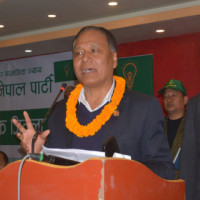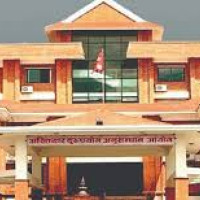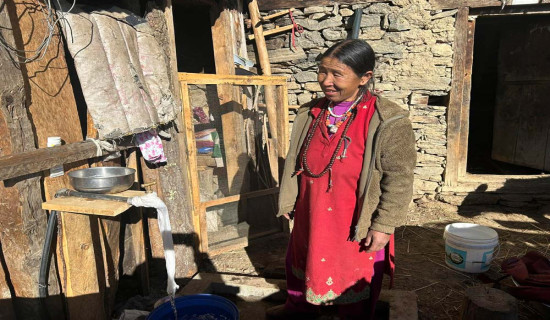- Tuesday, 16 December 2025
Frauds In Co-operatives
Harsher Punishment Requires As Deterrent
Co-operatives, according to the International Co-operative Alliance, are people-centred companies owned, managed, and administered by their members to meet their shared economic, social, and cultural needs and ambitions. Co-operatives unite individuals in a democratic and egalitarian manner. Co-operatives are democratically administered by the 'one member, one vote' norm, whether the members are consumers, employees, users, or residents. Members have equal voting rights regardless of the amount of cash invested in the business.
Co-operatives, as enterprises driven by ideals rather than profit, share globally recognised principles and work together to produce a better world through collaboration. Throughout the world, cooperatives are empowering people to work together to develop sustainable companies that provide long-term jobs and wealth by putting fairness, equality, and social justice at the centre of the enterprise.
Because co-operatives are not owned by shareholders, the economic and social advantages of their activities stay in the areas where they are created. Profits are either reinvested in the business or returned to members. The co-operative movement is far from a fringe phenomenon; at least 12 per cent of mankind is a member of one of the world's 3 million co-operatives.
Back home, our government has adopted a three-pillar economic policy based on the public, private, and co-operative sectors, as the constitution establishes policies and principles to achieve rapid and sustainable economic growth through the participation of these three sectors. The co-operative sector is viewed as a crucial component in attaining the socialist-oriented economy's objective of "creating an exploitation-free society by ending economic inequality."
Collaboration in community
Co-operative organisations are said to be run in the spirit of community collaboration to enable members and shareholders to develop social spirit and entrepreneurship. Since the establishment of the first co-operatives in Chitwan in 2013, the BS-Bakhan Loan Co-operative Society, hundreds of Co-operatives have been established on the basis of the Co-operative Act and universal co-operative ideals and principles. Co-operatives are also seen to do more than just collect deposits from members or the general public; they are also involved in putting them to constructive use and making the rural or backward economy sustainable.
Despite all of these ideal goals of uplifting the small, poor economies of backward areas and bringing members of societies closer, problems have arisen in the country's co-operative sector, with billions of rupees deposited by co-operative members or common depositors syphoned off by officials belonging to management bodies or boards of directors. Despite the fact that co-operatives and financial institutions maintained by these co-operatives have played an important role in Nepal's economic growth by offering chances for savings, investment, employment, and supporting entrepreneurship, some Co-operatives have encountered mismanagement, fraud, and the inability to repay money to members and depositors in recent years.
The Co-operative Savings Association has drawn attention to the predicament of 7.3 million Nepalese individuals who have been duped by various Co-operatives around the country. With depositors of as many as 14,000 co-operative institutions protesting the fraudulent conduct of these co-operative owners or management employees, the severity of the problem is clear. Citizens' funds totaling over 65 billion rupees have been stolen, putting them in desperate need of justice and resolution.
People with low incomes, daily wage earners, street vendors, small retail shop owners, and a few wealthy people who opted to deposit their money in co-operative-run financial bodies owing to the higher interest rates laid by these defrauding co-operatives have fallen victims, as many of these Co-operatives have been rendered troubled due to fraudulent operators, management staff, and a few others.

Several co-operative savings and credit organisations, including Oriental, Civil, Guna, Pashupati, Sumeru, Gautam Shree, Image Shivshikhar, Kantipur, and many other big names in the sector, have collected money from innocent people through their savings and credit institutions but have failed to repay deposits worth billions of rupees to their members. Members who have lost their deposits due to the deception of the fraudulent operators, management staff, and board members have been observed making many visits to the offices of these co-operatives only to return empty-handed. As a result, they have been forced to conduct protest marches in the capital and other regions of the country in order to put pressure on the government to act and assist them in reclaiming their money. Many depositors have lost their lifelong earnings, forcing them to live on the street. After losing all of their funds, they have no other options.
Weak regulatory oversight
As the problems of co-operatives’ defrauding of funds have gone from bad to worse, authorities have found that due to lax regulatory oversight, many of these co-operative operators, managers, and their relatives and other staff have been found syphoning off deposited funds and using them to invest in other sectors such as expensive real estate, housing businesses, purchasing other assets in the names of their relatives, depositing funds in the names of others to avoid laws, and engaging in a variety of other illegal financial activities that are not permitted to Co-operatives and operators by regulatory bodies such as the central bank.
It has now come to light that when the cheating from co-operative management organisations worsened, it appeared that our regulatory agencies failed to take timely action against the deceivers and cheats. This failure to take action in time encouraged many other operators who were not involved in the deception of innocent depositors to follow suit, adding a blemish to the reputation of the country's co-operative sector. The authorities often showed reluctance to take strong action as many of the operators had links with high and mighty people in the country.
Our authorities, on the other hand, reacted only when people began picketing co-operative offices and conducting rallies in the city and elsewhere and the media started reporting on co-operative frauds, which often create negative opinions against the authorities. Many of the co-operative operators are now either in jail or have fled to avoid punishment. Despite the arrests and incarcerations of these operators, many depositors have yet to receive their money back, owing to weak laws that make it impossible to penalise greedy operators and reimburse deposits to the public. Even after capturing the misleading operators and transferring millions of rupees of embezzled money into the names of others, the present legislation has not been helpful in assisting victims in obtaining their money. Some of these operators have already relocated to other countries. Returning them to Nepal and imprisoning them after compelling them to restore money to depositors looks like a difficult process.
All of the recent events have, needless to say, thrown Nepal's co-operative sector into disarray. It has also been discovered that just a few co-operative shareholders were interested in administering the co-operatives according to the regulations and co-operative principles. They violated the general norms of co-operative auditing when the right financial information was not communicated to the shareholders. General meetings are primarily ceremonial in nature. The same chairpersons and other office bearers are allowed to remain in their posts for a longer period of time as elections in many cooperatives become formalities. It is said that cooperative members must not allow the same chairperson to remain in office for more than two tenures. Changes in chairpersons and other office-bearers may help avoid fraudulent practises. Likewise, the regulating body was not regularly monitored, and wrong practises were promoted. In the meantime, many politicians are present in many of the cooperatives facing financial distress. Positive outcomes were hampered by the political influence of many cooperatives. Meanwhile, the COVID outbreak, the Russia-Ukraine war, and the economic downturn have all had a severe influence on numerous cooperatives. Many troubled cooperatives invest their deposits in sectors that are full of risks, such as real estate and share markets. Many borrowers who were members of these cooperatives failed to pay back the loan, which also turned distressed cooperatives bankrupt.
Attempts to penalise offenders
While the crisis in this important sector worsened, Dr. Damodar Regmi, Secretary of the Ministry of Land Management, Co-operatives, and Poverty Alleviation, stated that work was being done to fix co-operative concerns at the federal, state, and municipal levels. The government is committed to repaying co-operative victims' funds by creating suitable arrangements. The bank accounts and passports of 100 operators are being probed, as are over 1,000 of their records.
The co-operative Department has developed an action plan and has begun the implementation phase. Under the leadership of Jayakant Raut, a member of the National Planning Commission, the government organised a problematic co-operative proposal task group. The committee presented the Prime Minister with a 27-point report. A detailed report will be available in a month. The government is working properly to tackle the co-operatives problem.
Unfortunately, due to fraudulent practises and mismanagement, co-operative savings and loan companies in Nepal have suffered a crisis in recent years. Some owners and management staff have abused their positions of power, misleading and defrauding members by misappropriating or diverting cash for personal benefit. Such occurrences have damaged members' trust, eroding the basic core of these co-operative organisations.
The crisis impacts not only people who have lost their hard-earned wealth but also the economy and society as a whole. Co-operative organisations bridge the gap between conventional banking institutions and the unbanked or underbanked populace in Nepal's financial environment. The loss of confidence in co-operatives not only disturbs individual financial stability but also impedes the country's general economic progress.
To address the problem in co-operative savings and loan institutions, a multifaceted strategy involving many stakeholders, including regulatory organisations, co-operative management, and members themselves, is required. Some critical initiatives that may be made to rebuild confidence and support the long-term growth of co-operatives in Nepal include strict regulation and close monitoring of Co-operatives to avoid fraud and mismanagement. Regular audits, clear reporting systems, and harsh punishments for violators can all help discourage fraud.
In the meantime, Co-operatives should focus on excellent governance practises such as stringent internal controls, independent audits, and open decision-making procedures. Co-operative management may reclaim its members' trust by ensuring accountability and openness. Experts say financial literacy should be incorporated into co-operative operations. Members must be taught their rights and obligations, as well as how to make sound financial decisions. Training courses can provide members with the skills they need to actively participate in co-operative activities while also contributing to their personal financial well-being. They should encourage collaboration and networking among members in order to exchange best practises, information, and resources. This can serve to improve the sector as a whole and establish a support network for struggling businesses.
The problem confronting Nepal's co-operative savings and loan companies is not isolated but rather reflects wider issues in the financial sector. Besides cheating by co-operative operators, the country keeps witnessing financial frauds of different natures. Such incidents call for comprehensive financial sector reforms focused on consumer protection, regulatory supervision, and institutional resilience.
Tough penalty
At present, with many victims demanding the recovery of their funds, the government has taken steps to resolve the situation, but it would certainly take a long time for government agencies to recuperate the lost deposits. The victims, who have been suffering due to the greediness of the operators, must get their deposits back, for which our authorities must undertake whatever tasks they need to.
It is also true that with their inclusive and member-centric approach, co-operatives can restore their status as trustworthy and reliable financial intermediaries by addressing the present crisis and implementing the required changes, allowing individuals and communities to prosper.
Finally, it is clear there is a need for deep reforms to restore trust in co-operatives and foster long-term strategic engagement with individuals through co-operative principles. Similarly, increasing financial literacy, emphasising the importance of community participation, and highlighting the success stories of some co-operatives can help create a fraud-free environment. Many still recognise that there must be a strong and thriving co-operative sector, one of the three pillars of the economy, to empower communities and spur economic growth. To ensure that goal is achieved, harsher punishments must be handed out to those who seek to commit greed-driven fraud. Regulators must also increase their surveillance of co-operatives savings and credit institutions so any potential future acts of fraud can be avoided.
(Upadhyay is a former managing editor of this daily.)

















